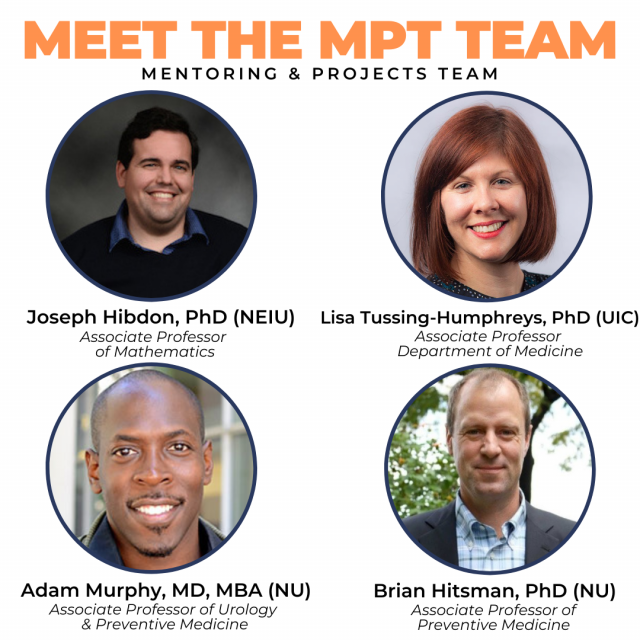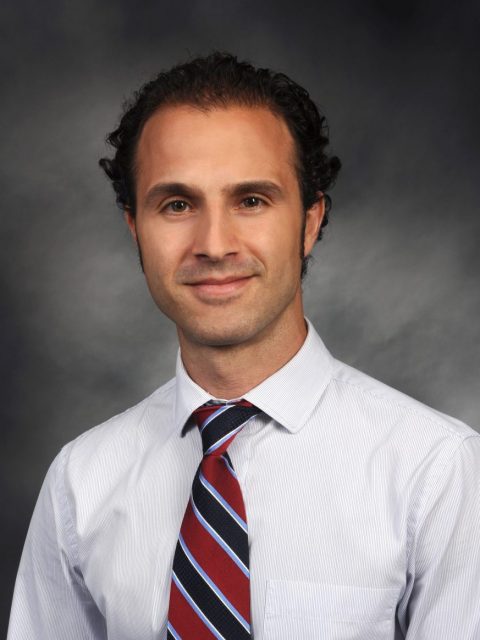Early Career Faculty
To support the career development and advancement of faculty and scientists, the Mentoring and Project Team (MPT) of the Planning and Evaluation Core has developed a program that will help match early-stage investigators with senior mentors at NEIU, UIC, and NU, develop their career development plans, find resources and organize events and activities to focus on skill building and grant and manuscript writing.
Mentoring Team

Some of our program offerings include: writing and mentoring groups, access to research library assets, notification of and access to important seminar and grant announcements.
Want to become an NIH Reviewer?
Early Career Reviewer (ECR) Program
The program aims to help early career scientists become more competitive as grant applicants through first-hand experience with peer review and to enrich and diversify CSR’s pool of trained reviewers. Click here for more information
Contact us to get involved or to learn more and check out our Early Career Faculty orientation video.
ECF Faculty Spotlight
Nabil Kahouadji, PhD (Northeastern Illinois University) 
1. Where is your hometown?
Bejaia, Algeria.
2. What led you to join the ChicagoCHEC Early Career Faculty Program?
It happened organically, as I was involved with CHEC sponsored activities since joining NEIU in fall 2016 (Women in Science conference, and the bi-annual Mathematical and Statistical Modeling of Complex Systems workshops), then joining the CHEC Research Education Core in fall 2018, and starting to leverage my mathematical research background to pursue cancer and health disparity research.
3. What are you currently working on?
Using electronic medical records of patients, I am incorporating both biological and socio-environmental approaches to machine learning algorithms for equitable and proactive (breast, lung and colorectal) cancer and health screening.
4. What are some of your hobbies/interests?
Rock Climbing
5. Who inspires you?
My (late) grandfather hard-work, integrity, kindness, and perseverance.
About your academic work:
1. What are your research interests?
Machine learning for cancer and health disparities research, time series forecasting, and geometric modeling.
2. What is the ultimate goal of your research?
The ultimate goal of my research is to empower individuals to effectively assess their cancer and health risks, and thus enable them to be proactive in detecting cancer and diseases at earlier stages.
3. How did you become interested in this area of research?
Stemming from my involvement in various activities of the U54 Chicago Cancer Health Equity Collaborative (CHEC) since Fall 2018, and from my research interests in geometric analysis, time series forecasting, predictive modeling and machine learning, I developed a strong interest in studying, understanding and investigating the effects of social and environmental factors on cancer and health disparities, and build robust and equitable machine learning methodologies to predict an individual’s cancer and health outcomes.
4. How does your research help advance health equity?
Equity is at the heart of my work. On one hand, I compare the predictive performance of machine learning algorithms across various training and testing scenarios to assess their potential to perpetuate existing biases and injustices. On the other hand, I design and implement a predictive methodology that not only produces the optimal predictive outcome for an individual, but also produces a hierarchy for the significant variables, thus enabling individuals (and practitioners) to be proactive in their health screening and identifying the important factors for preventive medicine.
5. How is your research funded?
National Science Foundation, Division of Mathematical Sciences, NSF PRIMES Award #2331502
6. Where have you recently published papers?
Communications in Contemporary Mathematics
Fields Institute Communications
Communications in Analysis and Geometry
Asian Journal of Mathematics
7. What types of collaborations are you engaged in across campus (and beyond)?
Regarding cancer and health disparities research, I am collaborating with Dr. Lisa Tussing-Humphreys (UIC), Dr. Sage Kim (UIC), and Dr. Kelsey Gabel (UIC) on three projects related to colorectal, lung and breast cancers.
At NEIU, I am collaborating with Dr. Reinke, Associate Professor of Biology, on statistical and geometric modeling related to painted turtles.
8. Has working with ChicagoCHEC influenced your work?
Yes, it did. My intentional focus on deriving machine learning methodologies that are ethical and the least prone to perpetuate existing biases and injustice has been directly influenced by my various involvement with CHEC activities and interactions with CHEC related researchers.
